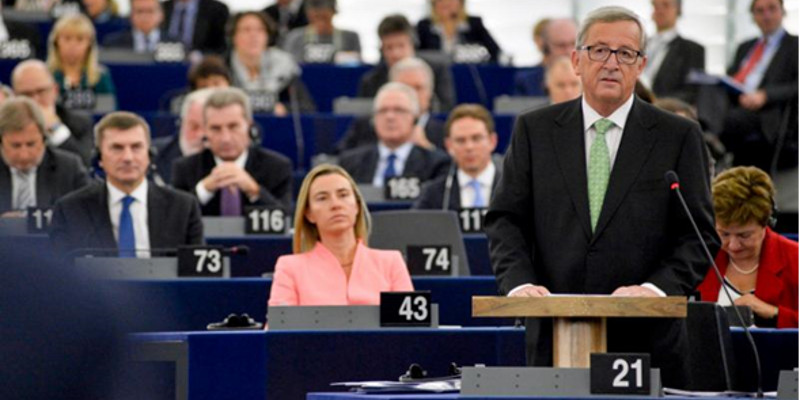Today, voters began casting their ballots in the three-day European Parliament elections, and climate policy appears to have become a more central concern to many voters since the last vote, five years ago.
A reminder of the impact EU politics can have on the renewable energy industry has come with finalization of the bloc’s ‘Clean energy for all Europeans’ policy package.
The legislation arrived just in time before Jean-Claude Juncker cleared his desk to make room for a new president of the European Commission. Juncker’s proposal of a clean energy package has finally been formally adopted in full by all EU institutions, and will be transposed into national law by EU member states.
In 2015 Juncker and the commission presented an energy union strategy and, in November 2016, proposed the clean energy package. Since then negotiations have taken place between and within the European Parliament, the commission and the European Council.
The EU Council of Ministers has now formally adopted the final four pieces of legislation to wrap up the clean energy package, concluding marathon negotiations.
Energy market reform
On March 27, the parliament passed the final pieces of legislation, for a new Electricity Market Regulation and Electricity Market Directive, as well as proposals for the Regulations on Risk Preparedness and on the Agency for the Cooperation of Energy Regulators. They have now been signed off by the council.
The update of the EU electricity market considers market designs that would facilitate better integration of intermittent renewable energy into the mix. The design foresees improved conditions for storage and prosumer market participation. For example, the package provides access to electricity markets for energy communities on the same basis as traditional utilities. To address such issues, the EU updated Electricity Directive (2009/72/EC) and Electricity Regulation (EC/714/2009).
Under the new system, the EU has set out rules to organize re-dispatch and curtailment of energy as well as flexibility options in a market-oriented fashion. It is a proposal lauded by virtual power plant operators as a crucial step in the right direction. A new subsidy cap has also been introduced for power plants with carbon emissions higher than 550g of CO2/kWh. An increase in cross-border energy trade between EU member states should also occur now legislative streamlining has taken place.
Popular content
Member states now have 1-2 years to transpose the complete package of eight legislative acts into national law.
The clean energy package also tackles energy performance in the building sector, which contributes 40% of the EU’s energy consumption and 36% of the bloc’s CO2 emissions. According to the EU plan, from December 31, 2020, all new buildings must be built in a ‘nearly zero energy buildings’ manner. Member states will also have to present a ten-year strategy to renovate building stocks in an energy efficient way to reduce carbon emissions. That is a move that could give residential as well as commercial and industrial solar-plus-storage a boost.
Renewable energy ambition
The package has revised the renewable energy direction (2018/2001) with a binding target of 32% of renewable energy in the generation mix by 2030, with a possible upwards revision by 2023. To achieve that, EU countries have committed to hitting national renewables targets for next year ranging from 10% in Malta to 49% in Sweden. Member states are also required to source at least 10% of their transport fuel from renewable sources by next year. The EU has set guidance on support schemes to avoid distortion of energy prices and a progress report will be published every two years.
European Commissioner for Climate Action and Energy, Miguel Arias Cañete, said: “This is the most ambitious set of energy proposals ever presented by the European Commission. It has been adopted in record time, with impressive support from the European Parliament and council. With its competition we have made the EU’s Energy Union – one of the ten political priorities of the Juncker commission – a reality. I truly believe it will accelerate the clean energy transition and give all Europeans access to secure, competitive and sustainable energy.”
Walburga Hemetsberger, CEO of SolarPower Europe, wrote an article for pv magazine that stated the European Parliament had been instrumental in achieving ambitious clean energy targets and policies, and called for readers to get out and vote! The Clean Energy Package’s 32% renewables target said Hemetsberger, is substantially higher than the 27% originally proposed by the commission, even if it falls short of the 35% proposed by the parliament.
Amid the back-slapping in Brussels, however, it should be noted the bloc is still falling short of the commitment it made in Paris to keep the global temperature rise below 1.5 degrees Celsius, despite a widely acknowledged ‘solar renaissance’ in Europe.
This content is protected by copyright and may not be reused. If you want to cooperate with us and would like to reuse some of our content, please contact: editors@pv-magazine.com.



3 comments
By submitting this form you agree to pv magazine using your data for the purposes of publishing your comment.
Your personal data will only be disclosed or otherwise transmitted to third parties for the purposes of spam filtering or if this is necessary for technical maintenance of the website. Any other transfer to third parties will not take place unless this is justified on the basis of applicable data protection regulations or if pv magazine is legally obliged to do so.
You may revoke this consent at any time with effect for the future, in which case your personal data will be deleted immediately. Otherwise, your data will be deleted if pv magazine has processed your request or the purpose of data storage is fulfilled.
Further information on data privacy can be found in our Data Protection Policy.